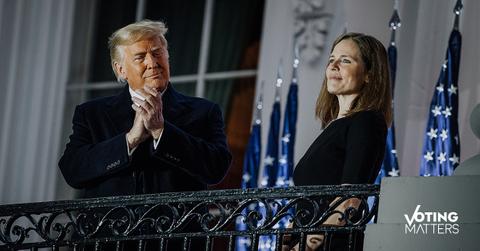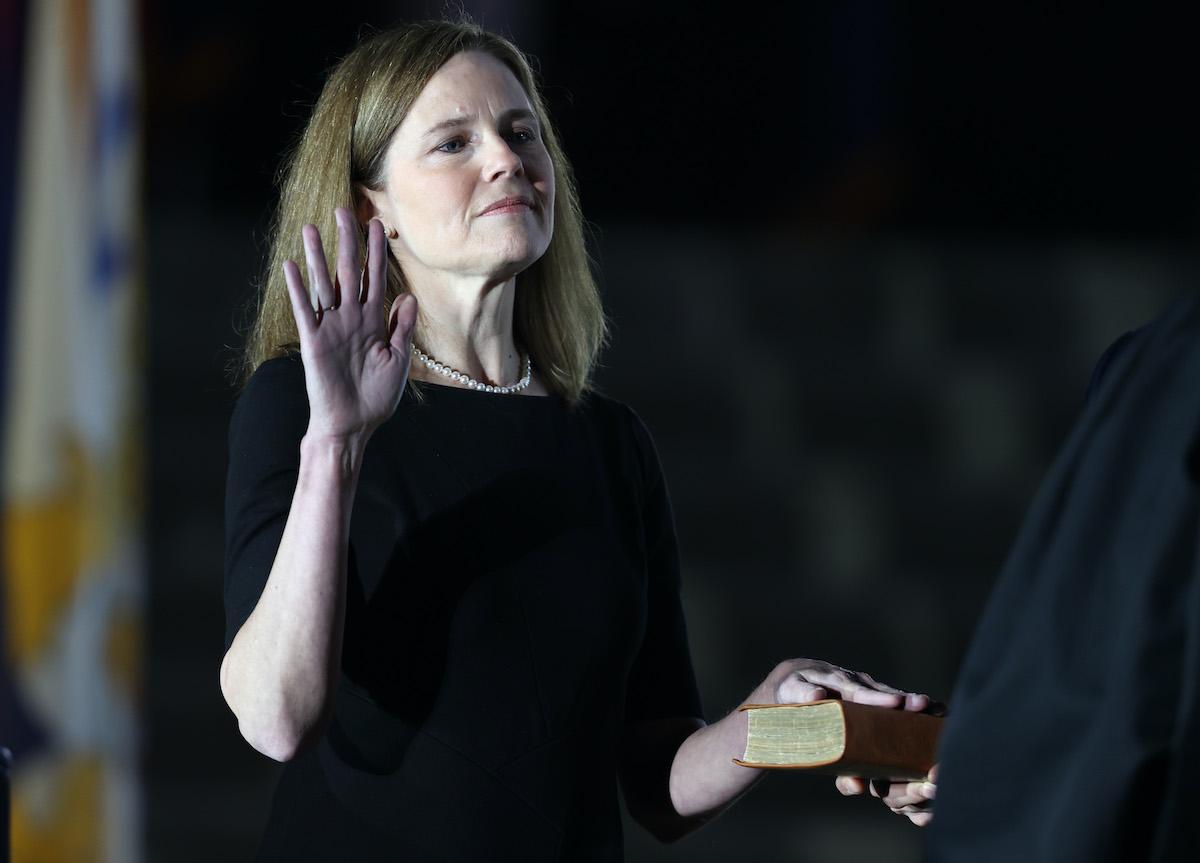Why Amy Coney Barrett's "Neutral" Views on Climate Change Are Actually Dangerous
Amy Coney Barrett shared her views on climate change during her Supreme Court confirmation hearings, and environmentalists were not impressed.
Updated Oct. 28 2020, 11:20 a.m. ET

Amy Coney Barrett was officially sworn into the Supreme Court on Monday, Oct. 26, meaning the court now has a 6-3 conservative majority. Many Americans are worried that this new imbalance could have devastating ramifications on the rights of various groups of people, including people of color, the LGBTQ+ community, women, and people who are most hurt by the climate crisis (who are mostly people of color and low-income communities). How exactly could Amy Coney Barrett’s Supreme Court confirmation affect the environment?
Keep reading to learn more about Amy Coney Barrett’s views on climate change, how the new court imbalance could affect climate protections, and more.
What are Amy Coney Barrett’s views on the climate crisis?

In Barrett’s Supreme Court confirmation hearings, senators asked Barrett several questions regarding the climate. Rather than directly stating if she agrees with the scientific consensus that human activity causes global heating, exacerbates the climate crisis, and threatens humanity, Barrett remained vague in her answers.
“I’m certainly not a scientist,” Barrett told Republican Sen. John Kennedy when he asked about her opinions on climate change during the second day of hearings. “I’ve read things about climate change. I would not say I have firm views on it,” she added.
On the third day of hearings, Democratic Sen. Richard Blumenthal asked Barrett if she believed human beings cause global warming. “I don’t think that my views on global warming or climate change are relevant to the job I would do as a judge, nor do I feel like I have views that are informed enough, and I haven’t studied scientific data.”
Also during Day 3, vice presidential candidate Sen. Kamala Harris challenged Barrett’s statements from earlier in the day, telling the judge that her views are in fact relevant. Harris asked Barrett if she believes "climate change is happening and it’s threatening the air we breathe and the water we drink?"
Barrett responded by saying that the climate crisis is "a very contentious matter of public debate," which she refused to comment on. "I... will not express a view on a matter of public policy, especially one that is politically controversial because that’s inconsistent with the judicial role, as I have explained," Barrett said.
Basically, Barrett did not express any strong views on the climate crisis, instead choosing to remain neutral. As Desmond Tutu put it, “If you are neutral in situations of injustice, you have chosen the side of the oppressor” — and the climate crisis is certainly an oppressor.
How could Amy Coney Barrett’s appointment impact environmental protections?
Barrett’s appointment will not immediately do anything to affect environmental protections in the U.S. However, when climate cases are presented to the Supreme Court, its new strong conservative majority could result in devastating rulings.
Kamala Harris brought up an example of the Supreme Court’s impact on climate cases during Barrett’s confirmation hearings: the 2007 Massachusetts v. EPA case. In the case, Massachusetts (and a few other states) petitioned the EPA to regulate greenhouse gas emissions from cars that contribute to global heating.
The Supreme Court ultimately voted in favor of Massachusetts in a 5-4 majority, with Justice Ruth Bader Ginsburg serving as the deciding vote. After the ruling, Harris explained, “the EPA responded by unequivocally finding that climate change and its impacts are a danger to the public health and welfare.”
Basically, the Supreme Court has a massive influence on environmental regulations, which have a direct impact on the climate crisis, which has a direct impact on people — primarily, Black, Brown, and low-income communities.
Barrett’s dispassionate comments on the issue of climate change during her confirmation hearings did not help her come across as the impartial judge she likely wants to be seen as. Instead, she framed herself as another GOP lawmaker who serves to politicize a scientific issue, and in doing so, she all but confirms environmentalists’ worst fears that this SCOTUS imbalance could hurt the environment, wildlife, and Americans next time a climate case passes through the Supreme Court.
Environmentalists strongly opposed Amy Coney Barrett’s nomination.
On Oct. 25, a coalition of more than 70 distinguished science and climate journalists wrote a joint op-ed for Rolling Stone protesting Barrett’s nomination. “Judge Coney Barrett has displayed a profound inability to understand the ecological crisis of our times, and in so doing she enables it,” wrote the group authors, which included writers from The New York Times, The Guardian, MIT Technology Review, and a Pulitzer Prize winner.
“Judge Coney Barrett’s responses are factually inaccurate, scientifically unsound, and dangerous,” they wrote. “How can Judge Coney Barrett rule on pending issues of climate change liability, regulation, finance, mitigation, equity, justice, and accountability if she fails to accept even the underlying premise of global warming? The answer is that she cannot.”
Nonprofit environmental law organization Earthjustice also expressed its disappointment in Barrett’s appointment this week. “Judge Amy Coney Barrett’s answers during the confirmation process left us concerned about her respect for the federal government’s responsibility to protect people, and her commitment to keeping the courtroom doors open for everyone,” said Earthjusice’s Senior VP of Programs Sam Sankar in a statement.
“Our most serious concern relates to Judge Coney Barrett’s responses to questions about climate change,” Sankar continued. “By characterizing the scientific certainty of climate change as a matter of policy debate, Judge Coney Barrett left us concerned about her willingness to distinguish science from politics.”
The hypocrisy and injustice of Barrett being sworn into the Supreme Court just a few weeks after Ginsburg's passing and just a week before the presidential election is real. Make sure you’re ready to cast your vote.
This article is part of Green Matters’ #VotingMatters, a campaign encouraging our readers to vote in the U.S. election on Nov. 3 to protect our planet and the people on it.